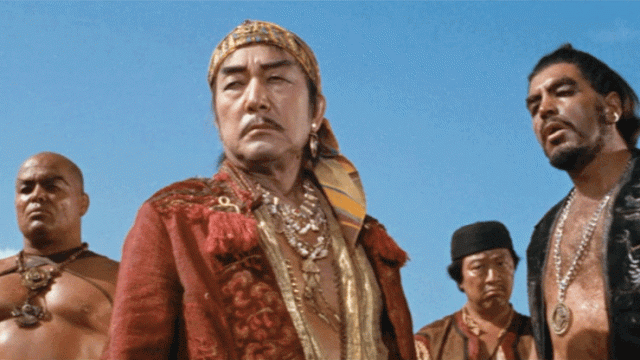Strange to think that one of the first sex symbols of early Hollywood was born in Chiba Prefecture—and we’re not talking “had missionary parents,” like the de Havilland/Fontaine sisters. We really are talking about a man whose father was a governor and whose mother was of the samurai class. So okay, part of that is Good Old-Fashioned Racism; the silent era was very big on the Exotic Foreigner as sex symbol. Hayakawa’s brooding good looks were in many ways ideal for that; you could never feel sure about what was going on in his head. Still, though, he may have been the villain, but you weren’t left thinking about the hero when Hayakawa was onscreen.
Kintaro Hayakawa was one of six children. A ruptured eardrum kept him out of the Imperial Navy; the eighteen-year-old attempted seppuku. When he recovered, he went to the United States, where he ended up as an actor, taking the name “Sessue,” Japanese for “snowy field.” He caught the attention of producer Thomas Ince, who we’ll definitely get to, and started making movies. Yes, he was frequently the Exotic Evil Foreigner, but he was definitely a draw, eventually out-earning many of his white costars.
Unfortunately, this was not a great time for Japanese people in the US, especially immigrants. Hayakawa could not legally become a US citizen. With the coming of the Code, he couldn’t be a romantic lead unless his costar was also Asian, because “miscegenation” was one of the forbidden categories. (That he could appear with Anna May Wong was mostly because people didn’t bother to learn differences between China and Japan until World War II, when they were divided into “allies” and “enemies.”) Further, the Japanese take was that he was encouraging stereotypes by appearing in the films he made.
He was in France during World War II. He had married fellow performer Tsuro Aoki; they and their three adopted children—one his by a white costar—had been living in Europe after work in the US started drying up. What exactly he did in France in those days is unclear, but he definitely seems to have at least helped the local Japanese community. There are stories that he fought for the French Resistance, but Hayakawa himself never said he had, from what I can tell. Still, he was at least spared the indignities of the internment camps.
Is it sad that I, among many others, mostly know him for his appearance as Kuala, the pirate chief in Swiss Family Robinson? Yeah, it is. I maintain it’s not entirely our fault, however; there were simply a limited number of options for us. Apparently Humphrey Bogart deliberately sought him out after the war to cast him in Tokyo Joe. Still, his career was not what it could have been if he’d been allowed to act as anything other than a villain and had his career limited altogether. He wanted to play the hero, and the US wasn’t ready for that.
Hayakawa apparently supported his family during the war by selling watercolors; support mine by contributing to my Patreon or Ko-fi!

